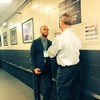Photo by Derick E. Hingle-USA TODAY Sports
Earlier this season, as a way for Alvin Gentry to reinforce his desire to play as fast as possible with the players he had, the New Orleans Pelicans dabbled with the idea of sticking DeMarcus Cousins down near the opposite basket whenever the opposing team shot their free throws.It wasn’t the most significant gamble, but there was also an obvious trade off. Instead of having one of the game’s better rebounder underneath his own rim to prevent any put-backs, Cousins would stand 80 feet away so that New Orleans could get into its early offense without any delay.Cousins is a three-point shooting bulldozer who’s made four All-Star teams and owns an Olympic gold medal. But placed within the context of Gentry’s truest vision, he was often deadweight, an invasive presence that forced the New Orleans coaching staff to search for different ways to be uptempo with him on the floor. The thought of Cousins jog-walking up the floor, forever behind the ball, preventing the Pelicans from jabbing a backpedaling defense with 18 seconds still on the shot clock, was New Orleans's idea of self-mutilation.The Pelicans were still one of the 10 fastest teams in the league with Cousins in the game, but they zoomed up to a speed that was nearly unseen in 20 years when he sat. Here’s one reason why:The solution came to the the Pelicans when they saw Tom Thibodeau do something similar with Karl-Anthony Towns. The idea there was less about accounting for a slow body in transition, and more about letting an unstoppable post-presence feast one-on-one, with acres of space around him and more than enough time to have at it.But Gentry didn’t scrap the idea when Cousins tore his Achilles. Instead, he gave the role to Anthony Davis, a move that offers one of the three best basketball players alive an early advantage he otherwise wouldn’t have. ("We can tell you but then we'd have to kill you," Gentry joked when I asked him to explain the reasoning behind it. "It's just something that we do, okay, we'll leave it at that.")The way Davis dominates basketball transcends the game itself—his closest precedent is probably Randy Moss rather than any big man that's actually played in the NBA. He runs literal slant and fly routes in the open floor, and by planting him alone in the frontcourt when the other team is shooting free throws, he's essentially a target in the end zone.According to CTG, Davis placed in the 22nd percentile at his position grabbing defensive rebounds off missed free throws this season, a huge drop from earlier in his career. In Davis's first five years, he was 86th, 64th, 81st, 83rd, and, in his rookie season, 90th. This is a fairly unique and easy way to unleash him. Teams that weren’t prepared found themselves in uncomfortable spots against rapid-fire mismatches that allowed no opportunity to breathe.In the first round against Portland, the Blazers were carved up by various wrinkles off this scheme, and all the space it grants Davis to operate in. The backdoor lob seen below is devastating. It's also a lot harder to pull off if Davis is beneath his own rim when New Orleans gets the ball.Here’s what happened when Jusuf Nurkic took away the lob and let Davis catch a pass at the high post. The Pelicans responded with a quick give-and-go between him and Rajon Rondo. The pressure was non-stop.We also saw it early on in Game 1 against the Golden State Warriors. Pace is an understandably notable theme in this series. The Pelicans averaged a league-high 102.73 possessions per 48 minutes during the regular season while no team enjoyed transition more than the Warriors. (The pace in Game 1 was 105.9, which was the fastest either team registered in these playoffs.)"[The Warriors] are a great defensive team when you set up in the half-court," Rondo said. "When [they] go to the free-throw line and [you] come back down at a slow pace, they’re able to set their defense. When they’re making threes or getting dunks, the ball bounces two or three times before you get the ball out of bounds, they’re obviously in a set defense."Here’s what happened early in Game 1 when the Pelicans pushed it up to Davis after Klay Thompson sunk a free throw. He caught the ball with only four seconds lopped off the shot clock, drove away from Shaun Livingston's double team, and scored over Kevon Looney.The Warriors are the Warriors for a reason, though. On the very next possession, right after Kevin Durant missed a free throw, Draymond Green sprinted back to provide Looney with some help, knowing the Pelicans wanted to feed Davis early in the clock once again.Looney was also ready. He shoved Davis out to the slot and forced a tough baseline turnaround. These are the problems that come with playing a defending world champion. Golden State is smart, huge, physical, and cohesive. What worked in previous rounds, and throughout the regular season, won't be so easy against them.That said, quick hitters like this are what make the Pelicans the Pelicans. Straying from their identity and what got them to the second round would be foolish. They should continue to fight early and often to force the Warriors to react as often as possible. Giving Davis a head start right after Golden State heads to the free-throw line is a simple way to do that.
Advertisement
Advertisement
Advertisement
